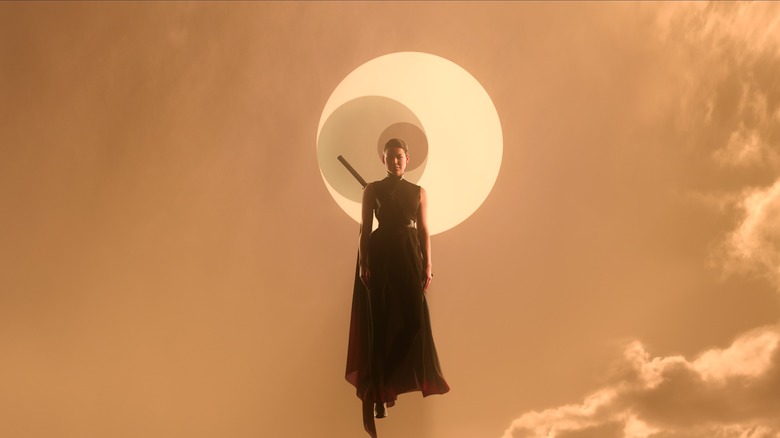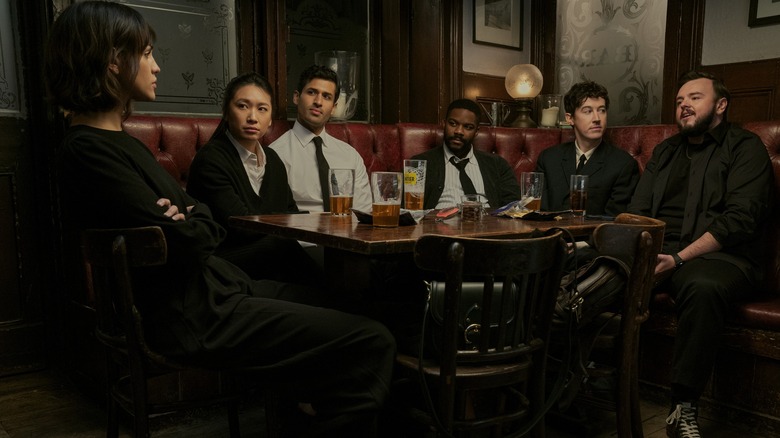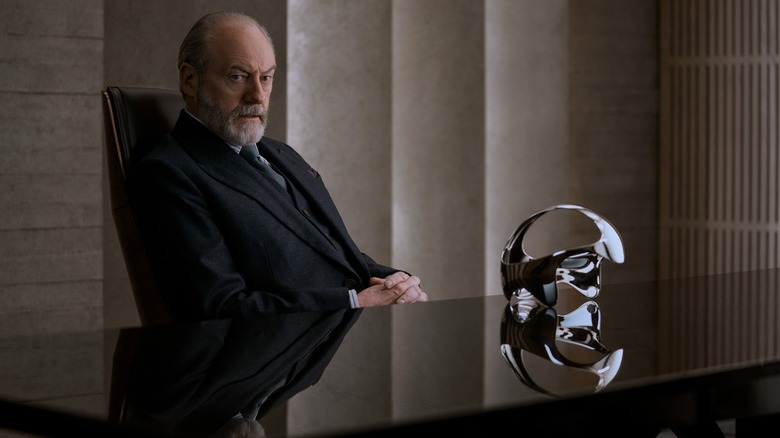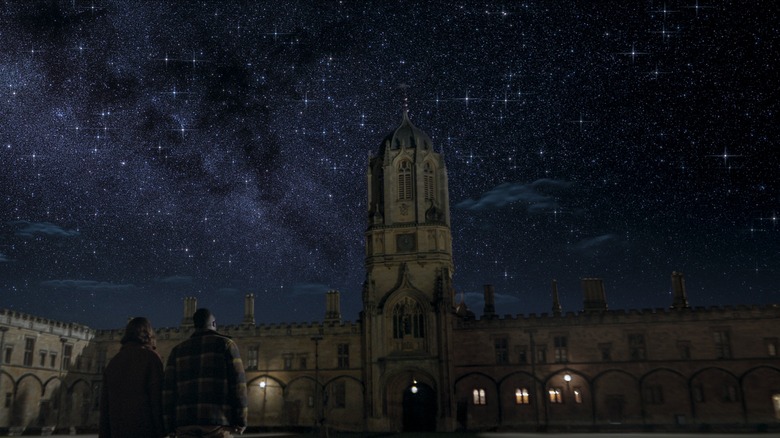3 Body Problem's Biggest Changes From The Book
This article contains major spoilers for the entirety of "3 Body Problem" and Liu Cixin's novels.
The idea of making major changes to the source material isn't exactly a foreign concept to "3 Body Problem" creators David Benioff and D.B. Weiss. The pair famously became household names during their tenure on HBO's "Game of Thrones." While they remain infamous among mainstream audiences for the very public criticisms leveled against the final season of the hit fantasy series, the more invested fans have followed their every move from the beginning. Changes both minor and major inspired breathless internet hot takes but, for the most part, the two proved adept at taking occasionally impenetrable concepts from the books and translating them into live action.
The same holds true for Netflix's "3 Body Problem" (which I reviewed for /Film here), a surprisingly faithful attempt to bring original author Liu Cixin's acclaimed "The Three-Body Problem" novel to life ... even as Weiss and Benioff (along with co-showrunner Alexander Woo) made sweeping alterations to significant portions of the book. Long before the series ever premiered, fans couldn't have failed to notice that the ensemble cast reflected a more international focus than the original, the compressed timeline incorporated various aspects from the sequel books, and the presence of many more differences, as well. These are sure to spark plenty of debate in the court of public opinion (and by that, of course, I mean the "The Three-Body Problem" subreddit), but they also only scratch the surface of what's become an impressive and immensely ambitious undertaking about humanity's first contact with aliens.
From here, we break down all the biggest and most spoilery changes "3 Body Problem" makes from the book, so proceed with caution.
The Oxford Five
"3 Body Problem" might be heavy on physics and quantum mechanics, but it doesn't take a rocket scientist to realize that none of the show's five main characters (colloquially nicknamed the Oxford Five) are present in the novels. In Liu Cixin's original story, we primarily follow one Chinese researcher named Wang Miao who first experiences the eerie countdown impairing his vision, spearheads a high-tech nanoparticle project, stumbles upon a virtual-reality video game vaguely connected to aliens, and soon crosses paths with police officer Shi Qiang (portrayed in the show by Marvel star Benedict Wong) to help investigate a rash of mysterious suicides within the scientific community.
In the show, no such character exists at all. Instead, Wang's narrative role has been carefully split up between members of the main cast, which includes Jess Hong as Jin Cheng, Eiza González as Auggie Salazar, Jovan Adepo as Saul Durand, John Bradley as Jack Rooney, and Alex Sharp as Will Downing. The live-action story reimagines its protagonists as a close-knit group of friends and intellectuals who graduated (or dropped out) from Oxford University, in which the shocking and abrupt suicide of a former professor brings our Oxford Five together. For the most part, Auggie and Jin do most of the heavy-lifting to fill Wang's role in the first book. As Chief Science Officer of a nanofiber company, Auggie becomes the main target of alien-sympathizing traitors (represented by Marlo Kelly's enigmatic Tatiana) who want the project shut down at all costs. She's the one who experiences the psychologically terrifying countdown timer, while Jin is free to focus on the VR game and puzzle out the mystery behind the eponymous 3-body problem.
Later in the season, however, further developments reveal just how much Benioff and Weiss had to restructure from the original.
Getting a head start
If fans thought introducing a brand-new cast of characters was controversial enough, then how about the fact that season 1 of "3 Body Problem" actually adapts more material than just the book it's (mostly) based on? Liu Cixin's seminal novel "The Three-Body Problem" is actually the first of a trilogy known as "Remembrance of Earth's Past," in which "The Dark Forest" and "Death's End" serve as the second and third installments. In perhaps its boldest and most unexpected move yet, the show gets a head start on incorporating characters and events that wouldn't unfold on-paper until much later in the trilogy.
This includes the appearance of Sophon (an artificial intelligence who appears in the virtual-reality game and is played by Sea Shimooka), the entire role of Thomas Wade (Liam Cunningham), and much of the dramatic events taking place towards the end of the season. Incorporating Sophon and Wade into the early going was probably the easiest no-brainer of all, streamlining several complicated and sprawling storylines from the novels into one that's much easier for viewers to follow and become invested in. Both characters don't appear in the flesh until the trilogy-capper "Death's End," and by then their inclusion can't help but feel somewhat abrupt. The show smartly gets ahead of this potential criticism and weaves them into the fabric of the plot rather naturally. Meanwhile, desperate gambits such as Saul's recruitment to the "Wallfacer" plan and Will's terminal diagnosis making him a prime candidate for the "Staircase Project" are lifted directly from the latter two novels, as well.
Although these events are separated by many years and involve vastly different characters in the books, streamlining the timeline of these disparate arcs makes for a much more complete viewing experience.
The devil in the details
As much as an article like this may make it seem like "3 Body Problem" takes a cudgel to the pages of the original story, that's not to imply that the series isn't incredibly faithful to the source material. While the present-day sequences have been overhauled quite a bit, the various scenes starring a young Ye Wenjie (Zine Tseng) taking place decades in the past are directly translated almost word-for-word from the books. And even where certain changes are made, these only make the original intention shine through all the more brightly.
The devil, as they say, is in the details. Take the shocking celestial phenomenon that the premiere episode builds up to, where the whole universe appears to inexplicably "blink" in the night sky to observers on Earth. This is more or less adapted from a similar event in the first book, although the original version unfolds much more inscrutably. The warning Wang Miao receives has to do with impossible alterations made to the background radiation of the cosmos, invisible to the naked eye but no less miraculous. Instead of bogging viewers down with scientific exposition and technical jargon, however, the show takes a much more visceral (and literal) route to achieve the same effect: humanity is at the mercy of a far superior technological force, one that can affect their daily lives despite remaining light-years away. Similar changes are made to the VR sequences and the storyline involving Mike Evans' (Jonathan Pryce) almost cult-like commune on the ship "Judgment Day," condensing and shortening several lengthy passages by boiling them down to their most bare essence. Knowing precisely when to abide by the book and when to switch things up is the mark of any good adaptation.
"3 Body Problem" is currently streaming on Netflix.



